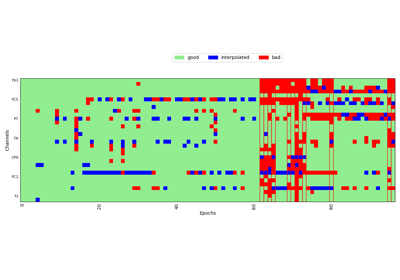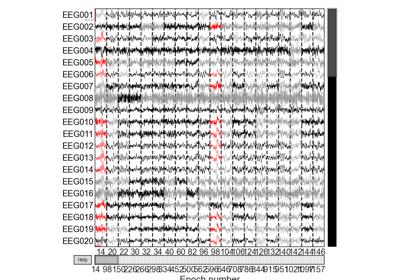autoreject.AutoReject#
- class autoreject.AutoReject(n_interpolate=None, consensus=None, thresh_func=None, cv=10, picks=None, thresh_method='bayesian_optimization', n_jobs=1, random_state=None, verbose=True)[source]#
Bases:
objectEfficiently find n_interpolate and consensus.
Note
AutoReject by design supports multiple channels. If no picks are passed, separate solutions will be computed for each channel type and internally combined. This then readily supports cleaning unseen epochs from the different channel types used during fit.
- Parameters:
- n_interpolate
array|None The values to try for the number of channels for which to interpolate. This is \(\\rho\). If None, defaults to
np.array([1, 4, 32])- consensus
array|None The values to try for percentage of channels that must agree as a fraction of the total number of channels. This sets \(\\kappa/Q\). If None, defaults to
np.linspace(0, 1.0, 11)- cv
int|sklearn.model_selectionobject Defaults to cv=10.
- picks
str|list|slice|None Channels to include. Slices and lists of integers will be interpreted as channel indices. In lists, channel type strings (e.g.,
['meg', 'eeg']) will pick channels of those types, channel name strings (e.g.,['MEG0111', 'MEG2623']will pick the given channels. Can also be the string values'all'to pick all channels, or'data'to pick data channels. None (default) will pick data channels {‘meg’, ‘eeg’}, which will lead fitting and combining autoreject solutions across these channel types. Note that channels ininfo['bads']will be included if their names or indices are explicitly provided.- thresh_method
str ‘bayesian_optimization’ or ‘random_search’
- n_jobs
int The number of jobs.
- random_state
int|np.random.RandomState|None The seed of the pseudo random number generator to use. Defaults to None.
- verbosebool
The verbosity of progress messages. If False, suppress all output messages.
- n_interpolate
- Attributes:
- local_reject_
list The instances of _AutoReject for each channel type.
- threshes_
dict The sensor-level thresholds with channel names as keys and the peak-to-peak thresholds as the values.
- loss_
dictofarray, shape (len(n_interpolate),len(consensus)) The cross validation error for different parameter values.
- consensus_
dict The estimated consensus per channel type.
- n_interpolate_
dict The estimated n_interpolate per channel type.
- picks_array_like, shape (n_data_channels,)
The data channels considered by autoreject. By default only data channels, not already marked as bads are considered.
- local_reject_
- fit(epochs)[source]#
Fit the epochs on the AutoReject object.
- Parameters:
- epochsinstance of
mne.Epochs The epochs object to be fit.
- epochsinstance of
- Returns:
- selfinstance of
AutoReject The instance.
- selfinstance of
- fit_transform(epochs, return_log=False)[source]#
Estimate the rejection params and finds bad epochs.
- Parameters:
- epochsinstance of
mne.Epochs The epochs object which must be cleaned.
- return_logbool
If true the rejection log is also returned.
- epochsinstance of
- Returns:
- epochs_cleaninstance of
mne.Epochs The cleaned epochs.
- reject_loginstance of
autoreject.RejectLog The rejection log. Returned only of return_log is True.
- epochs_cleaninstance of
- get_reject_log(epochs, picks=None)[source]#
Get rejection logs of epochs.
Note
If multiple channel types are present, reject_log[‘bad_epochs_idx’] reflects the union of bad trials across channel types.
- Parameters:
- epochsinstance of
mne.Epochs The epoched data for which the reject log is computed.
- picks
str|list|slice|None Channels to include. Slices and lists of integers will be interpreted as channel indices. In lists, channel type strings (e.g.,
['meg', 'eeg']) will pick channels of those types, channel name strings (e.g.,['MEG0111', 'MEG2623']will pick the given channels. Can also be the string values'all'to pick all channels, or'data'to pick data channels. None (default) will use the .picks attribute. Note that channels ininfo['bads']will be included if their names or indices are explicitly provided.
- epochsinstance of
- Returns:
- reject_loginstance of
autoreject.RejectLog The reject log.
- reject_loginstance of
- transform(epochs, return_log=False, reject_log=None)[source]#
Remove bad epochs, repairs sensors and returns clean epochs.
- Parameters:
- epochsinstance of
mne.Epochs The epochs object which must be cleaned.
- return_logbool
If true the rejection log is also returned.
- reject_loginstance of
autoreject.RejectLog|None The reject log to use. If None, the default reject log is used.
- epochsinstance of
- Returns:
- epochs_cleaninstance of
mne.Epochs The cleaned epochs
- reject_loginstance of
autoreject.RejectLog The rejection log. Returned only if return_log is True.
- epochs_cleaninstance of

